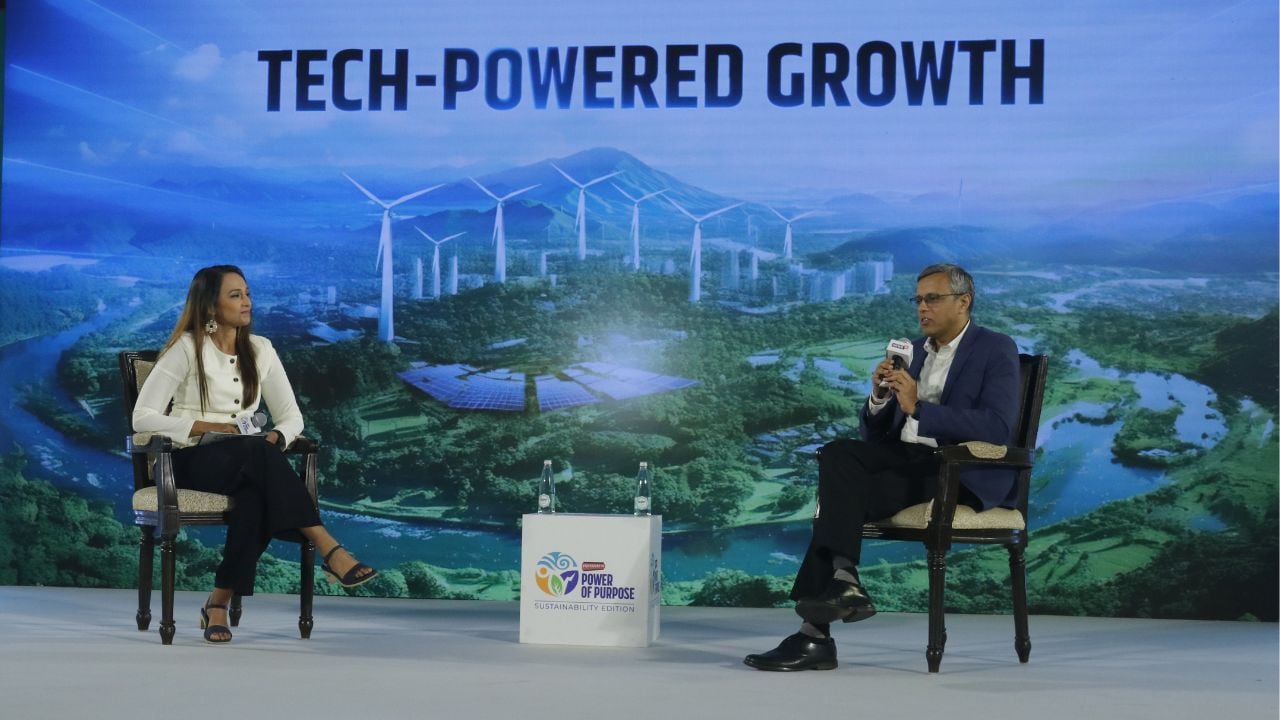New Delhi witnessed a gathering of purpose-driven minds debating how the young generation and business leaders are driving the sustainability efforts in the country. The Storyboard18 and Network18 Group’s Power of Purpose: Sustainability Edition held in New Delhi was graced by prominent industry leaders. Leading the dialogues at the edition were Union Minister Chirag Paswan, Rohit Kapoor, CEO – Food Marketplace, Swiggy, Angelo George, CEO, Bisleri International and Sanjeev Bikhchandani, Co-founder & Executive Vice Chairman, InfoEdge, Alok Lall, COO, Microsoft India and South Asia, and Ramnath Vaidyanthan, AVP & Head Of Sustainability, Godrej Industries, among others.
Speaking at Storyboard18’s Power of Purpose: Sustainability Edition, Alok Lall, COO, Microsoft India and South Asia, talked about how at Microsoft, the ambition is to empower every person and every organization on the planet to achieve more. “It’s truly a defining moment for climate change. I often go back to “Gradually, then suddenly,” a phrase from Ernest Hemingway’s The Sun Also Rises that is often used to describe the nature of climate change,” he said.
“Technology in itself has the opportunity to help businesses transform themselves in line with their power, purpose, and ambition, and how they can be responsible citizens,” Lall commented.
He shared, “Microsoft has been working on the sustainability front since 2009; in 2020, we became carbon neutral, and over the years we have continued to enhance our sustainability efforts. In 2020, we announced our sustainability goals, which were to be carbon negative, turn water positive and zero waste by 2030, and protect more land.”
“By 2050, our goal is to remove all the carbon emissions Microsoft has generated since its founding in 1975,” he added.
While addressing his insights as a tech player in the sustainability journey, Lall said, “You fundamentally need to rewire the organization in thinking, acting, and supporting the ecosystem. We need to understand what the ecosystem can do for us, how we fundamentally think about what we can do as organizations, what our customers can do, and what we can do globally. We honestly believe that we are not the only ones who can help make us carbon negative by 2030.”
How is AI helping Microsoft’s journey in sustainability?
In the ongoing race for AI dominance, tech giants are constantly showcasing their capabilities. However, the environmental impact of these advancements is a growing concern. As Lall points out, “AI’s immense energy consumption raises questions about the accountability of companies using these services. We need to address both energy requirements and the heat generated by their infrastructure.”
Microsoft, despite its significant AI strides, acknowledges this challenge. “We’re reevaluating our infrastructure design,” Lall explains. “How can we build data centers, systems, and cooling solutions that reduce electricity and water consumption? This is a key focus for us.”
While discussing Microsoft’s commitment to renewable energy, he shares, “In order for us to become carbon negative by 2030, we have to move all our infrastructure to renewable energy by 2025. By next year, 100 percent of our infrastructure will be on renewable energy, including solar.”
He highlighted that Microsoft is exploring what AI can do to help businesses use less energy. “How do you use AI to predict weather? Our open-source model allows customers to take that data, incorporate it, and predict weather with a high degree of accuracy. How do you use AI for physics, chemistry, and biology? How do you create a battery that uses less lithium? We have been working with a laboratory to find a stable battery that uses 70 percent less lithium.”
Sustainability goals
In India, Microsoft has recently signed a 440-megawatt contract with Renewable Power. “We are bringing down water usage by 70 percent in some of our data centers in Finland and Sweden. How do we use the minimal amount of energy that is carbon-based? Successful testing of hydrogen fuels in our data centers as backup generators presents an opportunity we can replicate across our 300-plus data centers,” Lall states.
“Our collaboration with NGOs has focused on raising awareness about sustainability and its importance. Many people lack understanding of sustainability practices and their impact. We’re also working together on disaster management initiatives, partnering with local agencies and communities. For instance, during cyclones, how can we identify the most vulnerable homes? Similarly, in Delhi’s scorching summers, how can we determine which houses require protection? These are key areas within our ecosystem.”
To bridge the gap between governments, NGOs, and tech companies, he highlights global initiatives we’re involved in. These initiatives aim to standardize sustainability reporting and address challenges like carbon footprint measurement. For example, how can we quantify the carbon emissions associated with a two-day hotel stay? How can we simplify the process of standardizing such measurements for organizations?”
“As a tech company, we have to find every avenue to empower businesses and individuals to comply with what the government needs to do,” he concluded.
Read More:Power of Purpose
